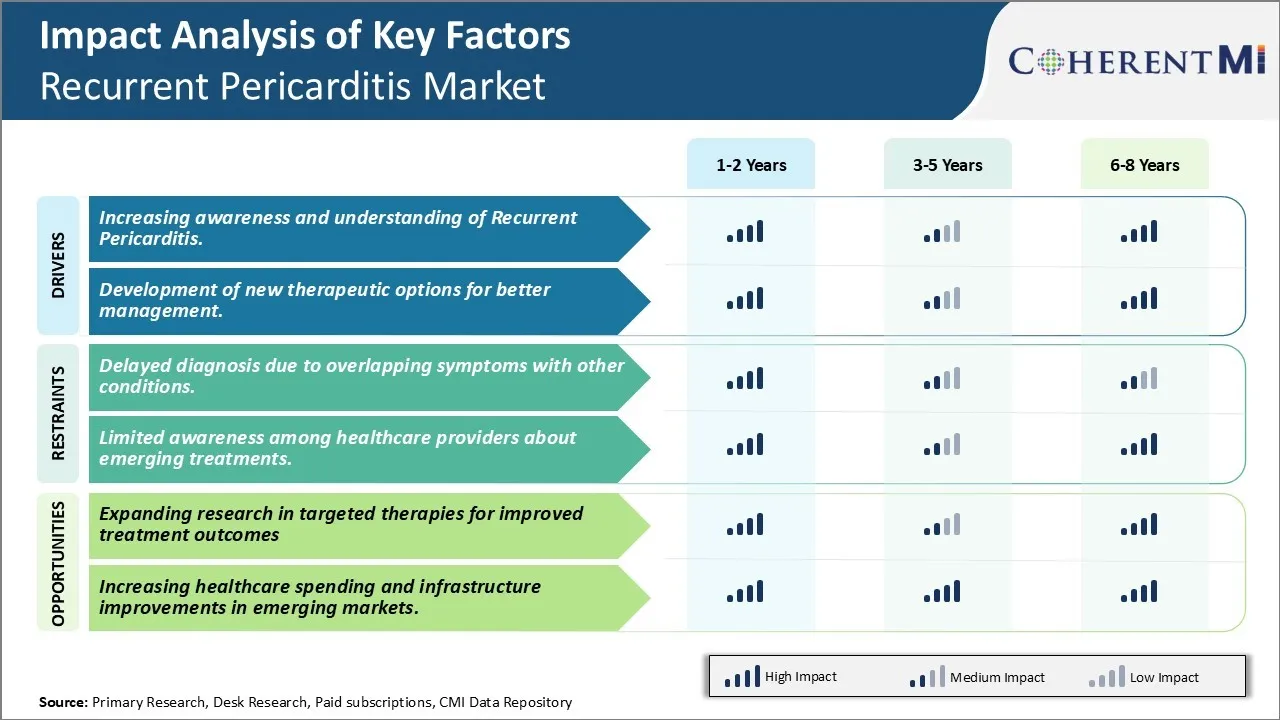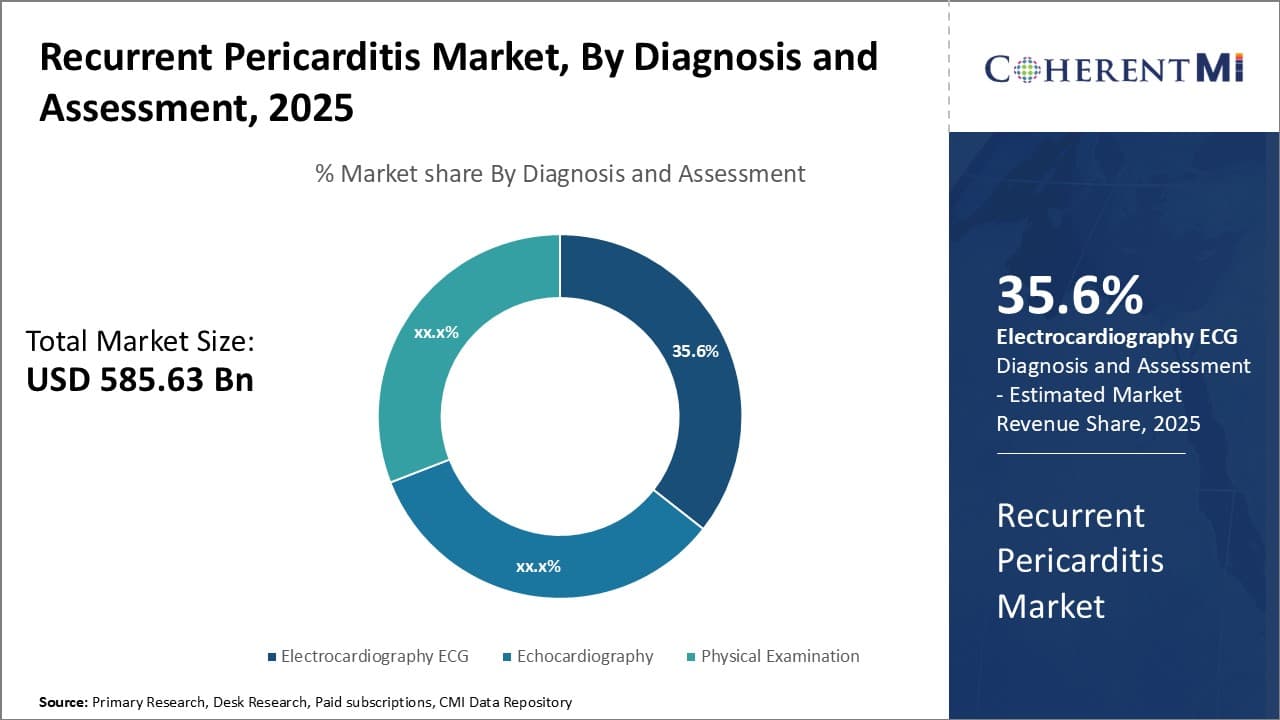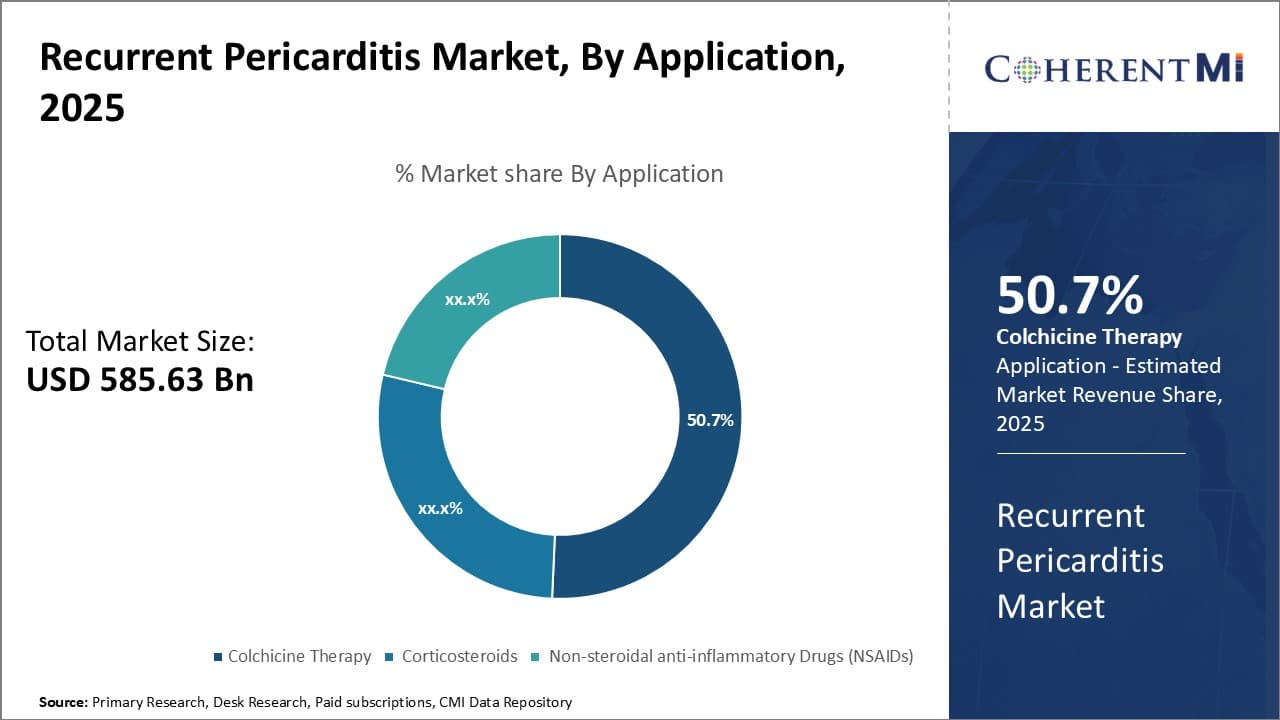

The Global Recurrent Pericarditis Market is estimated to be valued at USD 585.63 billion in 2025 and is expected to reach USD 851.90 billion by 2032, growing at a compound annual growth rate (CAGR) of 5.5% from 2025 to 2032. Nonsteroidal anti-inflammatory drugs (NSAIDs) and corticosteroids are widely used as the first line of treatment for recurrent pericarditis, driving the market growth.
The market is expected to witness positive growth over the forecast period owing to rising incidences of recurrent pericarditis disorders and increasing sales of corticosteroids and NSAIDs, advancements in targeted therapies and increasing awareness. Traditional treatments, such as NSAIDs and colchicine, often fail in resistant cases, prompting a shift toward biologic therapies like IL-1 inhibitors, including rilonacept and anakinra. The RHAPSODY trial in 2025 highlighted rilonacept's efficacy in significantly reducing recurrence rates, marking a paradigm shift in management strategies. The market evolution is supported by ongoing research and clinical trials focusing on innovative approaches to reduce disease burden and improve patient outcomes, making targeted treatment a key focus area. The growing awareness regarding recurrent pericarditis conditions and availability of different treatment options are expected to provide opportunities for the recurrent pericarditis market between 2025 and 2032.
Market Size in USD Bn
CAGR5.5%
| Study Period | 2025-2032 |
| Base Year of Estimation | 2024 |
| CAGR | 5.5% |
| Market Concentration | Medium |
| Major Players | R-Pharm International LLC, Unimed Laboratories, Cardiol Therapeutics Inc., Kiniska Pharmaceuticals, AstraZeneca and Among Others |
Market Driver - Increasing Awareness and Understanding of Recurrent Pericarditis.
The current clinical research on rare and unusual heart conditions underscores recurrent pericarditis is gaining attention within the medical community as well as among patients. Doctors are learning that what was once considered an idiopathic or poorly understood inflammation of the pericardium often has identifiable causes and predictable patterns. Through sharing of experiences between medical practitioners worldwide, clearer criteria for diagnosing recurrent pericarditis have emerged.
At the same time, greater accessibility to health information online has empowered patients to be more proactive in researching their conditions. Support groups specific to recurrent pericarditis have formed, allowing individuals suffering from this chronic illness to find community and advice. As patients take a more active role in managing their care, they are better able to recognize warning signs of an impending episode and seek treatment quickly.
As awareness builds, more cases are likely being diagnosed properly rather than misidentified or ignored. Doctors can feel confident making a recurrent pericarditis diagnosis based on established guidelines rather than dismissing pain as psychosomatic. With a clear medical opinion, patients access appropriate treatment sooner rather than struggling needlessly. The formerly isolated are connecting with peers to exchange coping mechanisms. Uncertainty and fear decrease as familiarity with recurrent pericarditis grows in the patient and provider communities alike.
Market Driver - Development of New Therapeutic Options for Better Management Boosts Patient Inflow.
Patients with recurrent pericarditis currently face limitations in treatment approaches as underlying causes are often elusive and current drugs may lose effectiveness over time. However, advancing research aims to change this unfavorable paradigm. Scientists delve deeper into molecular pathways that trigger pericardial inflammation recurrence so new medications can be designed to target specific triggers. Drugs now under investigation have novel mechanisms of action beyond generic corticosteroid or colchicine regimens normally relied upon.
By emphasizing concept trials, upcoming therapies meet treatment expectations through diverse formulations like monoclonal antibodies, interleukin inhibitors, JAK pathway modulators or gene therapies. One antibody already showed early signs of controlling recurrent pericarditis episodes that resisted multiple standard drugs. By blocking a key inflammatory protein rather than general immunosuppression, it represents a milestone in personalized treatment strategies.
Along with pharmaceutical developments, minimally invasive procedures also mature. Image-guided injections deliver precise, high doses of corticosteroids directly onto the pericardium for sustained local relief. Applied via small catheter systems, such interventions are relatively low-risk with few side effects compared to lifelong oral medications. As technology advances, guided injections can guide genetic or cellular therapies to problem spots with unprecedented targeting ability.
 To learn more about this report, Download Free Sample Copy
To learn more about this report, Download Free Sample Copy
Market Challenge - Delayed Diagnosis Due to Overlapping Symptoms with Other Conditions.
One of the key challenges faced in the recurrent pericarditis market is the delayed diagnosis of the condition due to overlapping symptoms with other cardiac conditions. Recurrent pericarditis presents with symptoms such as chest pain, which can easily be mistaken for other conditions such as myocarditis, pulmonary embolism or gastroesophageal reflux disease. This results in misdiagnosis and delay in initiating appropriate treatment. Symptoms may also not persist long enough for diagnostic tests to confirm pericarditis. The unpredictable nature of recurrence further compounds the diagnostic challenges. Delayed diagnosis can lead to unnecessary testing, increase in healthcare costs and worsening of the condition. It also increases patients' anxiety and uncertainty regarding their illness. Given the subjective nature of symptoms, there is need for biomarkers and clinical criteria with high specificity and sensitivity to enable early and accurate diagnosis of recurrent pericarditis.
Market Opportunity: Expanding Research in Targeted Therapies for Improved Treatment Outcomes
One of the key opportunities in the recurrent pericarditis market is the expanding research in targeted therapies that have potential to improve treatment outcomes for patients. Currently, treatment options such as NSAIDs and colchicine provide relief of symptoms but do not alter the disease course. With increasing understanding of the pathophysiology of recurrent pericarditis, several targeted molecules are under investigation. Examples include anti-IL1, anti-IL6 and anti-TNF biologics that specifically block inflammatory pathways involved in recurrent pericarditis. Ongoing clinical trials of these newer targeted therapies have shown promise in reducing recurrences, disability and need for additional treatments. Their approval can potentially transform the management of recurrent pericarditis. Given the chronic nature of the condition and need for long term treatments, targeted therapies with improved efficacy, safety profile and quality of life benefits have a huge market potential.
Recurrent Pericarditis is most commonly treated with non-steroidal anti-inflammatory drugs (NSAIDs) as first-line therapy. NSAIDs such as ibuprofen (Advil) or naproxen (Aleve) are effective in relieving chest pain and inflammation during acute episodes. However, some patients experience recurring bouts despite NSAIDs. In these cases, prescribers may turn to colchicine (Colcrys) as a second-line treatment. Colchicine, an anti-gout and anti-inflammatory medication, can help prevent future recurrences when taken long-term for 6 months post-episode.
For patients who continue having recurrences despite NSAIDs and colchicine, corticosteroids are considered third-line options. Prescribers commonly use corticosteroids like prednisone in tapering doses to manage acute flares. However, long-term steroid use poses side effects, so they are not ideal for maintenance therapy. When recurrences remain frequent or severe despite other options, immunosuppressants may be prescribed. Azathioprine (Imuran) is an immune-modulating drug often used in later stages as it has shown effectiveness in reducing future attacks.
Along with efficacy, prescribers also consider side effect profiles and costs when determining treatment approaches. Generic colchicine and steroids offer affordable options, while specialty drugs like anakinra (Kineret) are more expensive. Patient preferences for oral medications over infusions are another factor in prescribing decisions.
Recurrent pericarditis can be broadly classified into 3 stages based on symptoms - acute, recurrent and chronic. Acute stage presents with sharp chest pain that improves with recumbency. First line treatment involves use of nonsteroidal anti-inflammatory drugs (NSAIDs) like ibuprofen or indomethacin to reduce inflammation. Corticosteroids like prednisone may be added if symptoms persist despite NSAIDs.
If symptoms recur after tapering NSAIDs, it is considered recurrent stage. Colchicine becomes the preferred treatment at this stage due to its excellent efficacy in reducing recurrences. At a dosage of 0.5-1mg daily, colchicine helps prevent attacks in around 70-80% of cases by inhibiting neutrophil mobility and activity. It is generally well tolerated though diarrhea is a common side effect.
Chronic stage is when symptoms reoccur frequently despite above treatments. Second line immunosuppressants like azathioprine or methotrexate may be tried to reduce inflammation by blocking purine synthesis or folic acid metabolism respectively. They achieve remission in 50-60% cases when combined with colchicine. Anti-TNF drugs like infliximab infusions can be highly effective in chronic refractory cases, likely by preventing cytokine-induced inflammatory pathways. Surgical pericardial stripping may be considered if medical management remains unsuccessful.
Product innovation - Developing novel drug formulations has been a successful strategy for companies to gain an edge in this market. In 2018, Pfizer launched a subcutaneous formulation of colchicine (Colcrys) specifically for recurrent pericarditis. This provided an easy-to-administer alternative to the traditional oral formulation. Studies showed Colcrys reduced symptoms and relapses compared to placebo. This innovative drug formulation helped Pfizer gain a significant market share.
Clinical Trial Data - Generating clinical evidence from rigorous trials helps validate treatment options and improves patient outcomes. In 2019, Novartis published results from the PREMIER phase 3 trial which showed their anti-IL-1 drug canakinumab (Ilaris) reduced the annual recurrence rate of pericarditis attacks by 50% compared to placebo. This robust data allowed Novartis to receive FDA approval for canakinumab in 2020, making it the first targeted therapy approved for recurrent pericarditis.
Strategic Collaborations - Partnering with other companies complements strengths and expands capabilities. In 2017, BioLineRx outlicensed BL-8040, a novel treatment for cardiovascular conditions, to Kamada for further development in recurrent pericarditis. Kamada is now conducting a phase 2 trial of BL-8040 which readouts in 2023. Such partnerships allow smaller companies to progress promising therapies by leveraging larger partners' development expertise and commercial infrastructure.
These are examples of impactful strategies adopted by key players that have helped them gain FDA approvals, increase market share and advance innovative therapies through clinical trials for recurrent pericarditis. Data-backed evidence and strategic partnerships have proven to be winning approaches.
 To learn more about this report, Download Free Sample Copy Insights, By Diagnosis and Assessment, Rise in Prevalence of Cardiovascular Diseases Drives ECG Adoption.
To learn more about this report, Download Free Sample Copy Insights, By Diagnosis and Assessment, Rise in Prevalence of Cardiovascular Diseases Drives ECG Adoption.
By Diagnosis and Assessment, Electrocardiography (ECG) contributes the highest market share at 35.60% in 2025 owing to its ability to effectively diagnose recurrent pericarditis. ECG plays a crucial role in evaluating patients experiencing symptoms such as chest pain or difficulty in breathing. It helps detect abnormalities in the heart's rhythm and electrical activity, which are common in recurrent pericarditis cases. The growing prevalence of cardiovascular diseases worldwide has boosted the diagnostic volume for ECG. Moreover, ECG is usually the first-line investigation performed to evaluate pericardial involvement in recurrent cases. It offers definitive evidence of pericarditis and helps differentiate it from other cardiac conditions. The non-invasive and cost-effective nature of ECG makes it widely acceptable among healthcare professionals and patients for recurrent pericarditis screening.
 To learn more about this report, Download Free Sample Copy
To learn more about this report, Download Free Sample Copy
Insights, By Application, Colchicine's Anti-inflammatory Properties Dominate Therapy Segment
In terms of By Application, Colchicine Therapy contributes the highest market share at 50.70% in 2025 owing to the drug's potent anti-inflammatory properties. As recurrent pericarditis is characterized by recurrence of pericardial inflammation, Colchicine, a natural alkaloid product proves to be an effective therapeutic option. It efficiently reduces inflammatory response by inhibiting microtubule function, thereby preventing migration of inflammatory cells. Colchicine also inhibits neutrophil chemotaxis and decreases IL-1β levels which play a major role in recurrent pericarditis pathogenesis. Additionally, it is proven safe and well-tolerated orally with minimal side effects. These advantages over alternative treatment methods like NSAIDs and corticosteroids have positioned Colchicine as the front-line therapy for recurrent pericarditis worldwide.
Insights, By End-User, Hospitals Lead the End-User Segment Backed by Demand for Advanced Diagnostic Facilities.
By End-User, hospitals contribute the highest market share. This is attributed to availability of advanced diagnostic equipment like ECG, echocardiography, MRI required for definite diagnosis of recurrent pericarditis. Many recurrent cases also require invasive procedures or short stay for symptomatic treatment, for which hospitals are well-equipped with trained medical staff. Moreover, tertiary and academic medical centers actively enroll recurrent pericarditis patients for clinical trials and research studies. The possibility of developing life-threatening complications also drives patients towards hospitals. Effective reimbursement policies further encourage hospitalizations for recurrent pericarditis management. Hence, hospitals remain the primary bastion for recurrent pericarditis diagnosis and treatment globally.
The Recurrent Pericarditis market is positioned for significant growth due to the increasing incidence of the condition and the ongoing development of novel therapeutic options. Current management strategies include the use of colchicine and corticosteroids, with ongoing research into targeted biologics like Rilonacept offering hope for improved patient outcomes. As the understanding of the disease improves, the market will continue to expand, driven by greater investment in research and development, increased awareness among healthcare providers, and enhanced patient education.
The major players operating in the Recurrent Pericarditis Market include R-Pharm International LLC, Unimed Laboratories, Cardiol Therapeutics Inc., Kiniska Pharmaceuticals, AstraZeneca, Novartis AG, Merck & Co Inc., Allergan Plc, Bayer AG, Reckitt & Benckiser Co. Inc and PerkinElmer Inc.
Would you like to explore the option of buying individual sections of this report?
Ghanshyam Shrivastava - With over 20 years of experience in the management consulting and research, Ghanshyam Shrivastava serves as a Principal Consultant, bringing extensive expertise in biologics and biosimilars. His primary expertise lies in areas such as market entry and expansion strategy, competitive intelligence, and strategic transformation across diversified portfolio of various drugs used for different therapeutic category and APIs. He excels at identifying key challenges faced by clients and providing robust solutions to enhance their strategic decision-making capabilities. His comprehensive understanding of the market ensures valuable contributions to research reports and business decisions.
Ghanshyam is a sought-after speaker at industry conferences and contributes to various publications on pharma industry.
Recurrent Pericarditis Market is segmented By Diagnosis and Assessment (Electrocardiography (ECG), E...
Recurrent Pericarditis Market
How Big is the Recurrent Pericarditis Market?
The Global Recurrent Pericarditis Market is expected to be valued at USD 551.3 billion in 2025 and reach USD 851.90 billion in 2032.
What are the major factors driving the Recurrent Pericarditis Market growth?
The increasing awareness and understanding of recurrent pericarditis. and development of new therapeutic options for better management are the major factor driving the Recurrent Pericarditis Market.
What will be the CAGR of the Recurrent Pericarditis Market?
The CAGR of the Recurrent Pericarditis Market is projected to be 5.3% from 2024-2031.
What are the key factors hampering the growth of the Recurrent Pericarditis Market?
The delayed diagnosis due to overlapping symptoms with other conditions. and limited awareness among healthcare providers about emerging treatments are the major factor hampering the growth of the Recurrent Pericarditis Market.
Which is the leading Diagnosis and Assessment in the Recurrent Pericarditis Market?
Echocardiography is the leading diagnosis and assessment segment.
Which are the major players operating in the Recurrent Pericarditis Market?
R-Pharm International LLC, Unimed Laboratories, Cardiol Therapeutics Inc., Kiniska Pharmaceuticals, AstraZeneca, Novartis AG, Merck & Co Inc, Allergan Plc, Bayer AG, Reckitt & Benckiser Co. Inc, PerkinElmer Inc. are the major players.